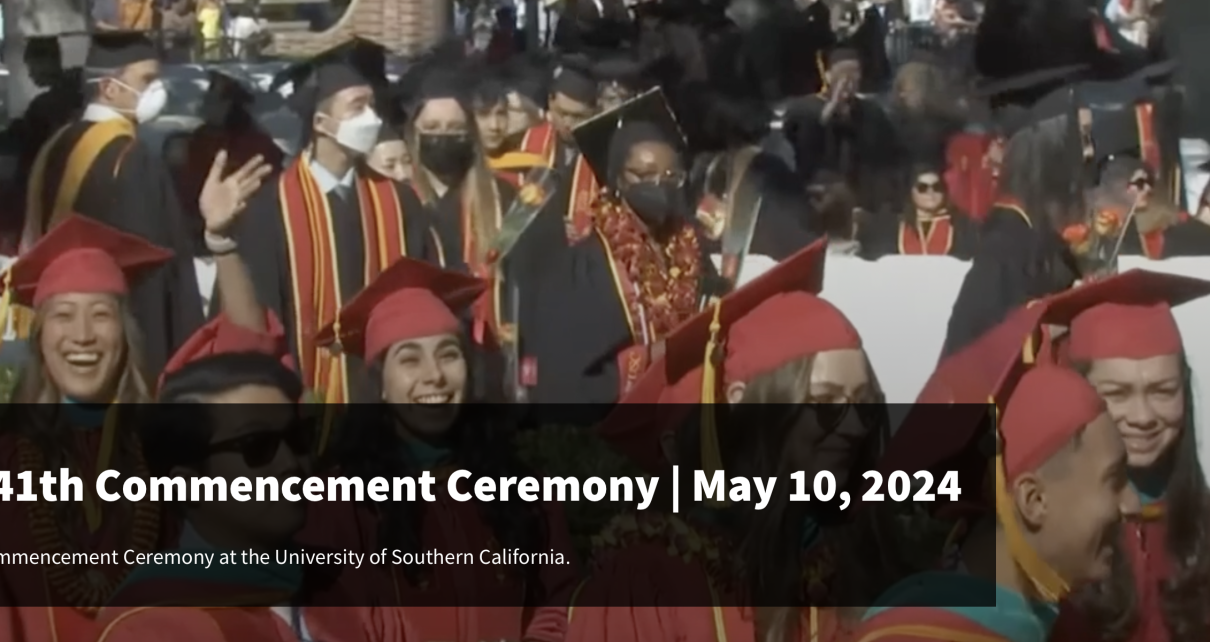
USC Commencement. (Photo: https://commencement.usc.edu)
Academics View Less Asian Stereotypes in Hollywood as a Negative
Do these academics realize that in what they are advocating for, they could actually cost Asian actors jobs?
By J. Mitchell Sances, November 15, 2023 2:01 am
A new study from USC on diversity in film and television has been released. The study focuses on representation of Asians and Asian Americans in the current on-screen culture. The good news: Asian representation is higher than it has been in the past, and very few of the Asian characters played into some hackneyed stereotype. The bad news: the media and the academic activists who conducted the study view this as a negative.
USC’s Norman Lear Center in conjunction with Gold House, a non-profit organization that seeks to champion Asian media creators, conducted research based on films and television shows on some of the major streaming services. They counted and categorized the number of characters who were Asian or Asian American in a quantitative and qualitative analysis. They report that from the year 2007 to 2022 the percentage of Asian characters increased from 3.4% to 15.9% respectively, an increase of approximately 5 times the number of characters. Considering the Asian population in the United States sits at approximately 7.2% according to the latest Census data, their representation on the screen is more than fair.
The research also found that for a vast majority of these Asian characters, there was no semblance of stereotyping. The study mentions the tropes of emasculated Asian men, overly sexualized Asian women, poor drivers, martial arts experts, and others were almost completely absent. They report that 82% of the Asian characters were “race-agnostic”. Of course, as is the penchant of academic activists, they found it necessary to coin this new word in the realm of racism. “Race-agnostic depictions are those in which a character’s race or ethnicity are mentioned only briefly or not at all,” the research says.
Any rational person would view these facts as a positive. A minority group that was often overlooked is now getting fair, if not inflated, screen time. Furthermore, when those minority characters are represented, they are portrayed without race-based stereotypes; there are no racist reminders to the audience just in case they missed what was blatantly apparent to their eyes. The audience can finally enjoy the nuance and skills of the actors, writers, and directors without paying much attention to the race of the character on screen. Asian representation has come a long way since the gong-announced entrances and overly affected caricature of Long Duk Dong in Sixteen Candles.
However, the academics of USC seem to hold issue with these very positive steps. By focusing on the characters and not centering the plot around their race or ethnicity, these academic activists are accusing Hollywood of whitewashing the characters. “[O]ur results also indicate that there is a meaningful risk of casting Asian actors in roles that emphasize proximity to whiteness rather than authentic cultural specificity,” the researchers write. Apparently the audience is too stupid to realize that someone is Asian, and, therefore, their race must be inextricably linked to the story and mentioned ad nauseam.
Do these academics realize that in what they are advocating for, they could actually cost Asian actors jobs? If a character is written with no specific race in mind, and an Asian actor auditions for the role, then by their logic it would be wrong for the Asian actor to be hired due to the “race-agnostic” part. If being race-agnostic is a bad thing, then Asian actors would only play Asian characters.
Of course, the racial zealousness of academia gets worse. The researchers openly admit that Asian actors have voiced their preference for playing in these “race-agnostic” roles; however, the academics clearly know what is best for these actors and condemn their opinions. Sociologist Nancy Wang Yuen says, “In my interviews with Asian-American actors, many expressed a desire to play roles written for ‘white girls’ because those tend to avoid stereotypes. [. . .] But the choice between either playing a stereotype or playing roles with no cultural specificity shortchanges Asian-American actors. I want to see a variety of identity expressions that represent the full breadth of the Asian-American experience.” The actors have made it very clear that getting rid of stereotypes and not pigeonholing them into a race-specific role is a positive thing.
So why are these activists creating a problem where one does not exist? The answer seems obvious; sparking outrage, crying racism, and stoking cultural wars signs their paychecks. Having stereotypical Asian characters wearing kimonos with bound feet and crashing every time they get behind a wheel would be called racist, and rightly so. Now that these tropes are no longer commonplace in film and television, activists must turn around a claim that not making race a central part of a character’s story is equally racist and wrong.
Academics can only continue to make money if their “research” perpetuates a narrative and points out the evils of society. Hypocritically in the eyes of academia, Hollywood’s portrayal of Asians as white, the ultimate evil in the world, is the immorality du jour. Lumping Asians into a group with white people is only acceptable in affirmative action for college admissions, not anywhere else.
- Good Times Reboot Nothing But Stereotypical Trash - April 2, 2024
- CA Senate Candidates Recite Democrat Dogma to LGBT Activists - February 8, 2024
- OPINION: Harvey Milk Club Rescinds Biden Endorsement Due to Pro-Hamas Propaganda - January 30, 2024





I am curious: what are the names and titles of the authors of the study in question?
Do they have a response to the opinions expressed above? I would be interested to know, having read through this short essay. How much money was spent by the Norman Lear and “Gold House”? Where do those centers, in turn, get their funding?
Is there a pipeline for academic opinion from Exposition Park to arrive at the production offices in Burbank, Studio City, and Culver City? Does anyone in the film industry, or an agent for asian actors, have a reflection on the study they could share?
Perhaps it is not worth exploring the issue further, but I hovered my mouse over a link to this study and decided rather than reading it hatefully I would instead ask the author of this post my questions.
Soraya Giaccardi, M.S.,
Eun Jung (Kristin) Jung, M.A.,
Dana Weinstein, M.A.,
Shawn Van Valkenburgh, Ph.D.,
Erica L. Rosenthal, Ph.D.
The USC Norman Lear Center is led by Director Marty Kaplan and Managing Director Johanna Blakley. Special thanks to Veronica Jauriqui for project management and report design.
Gold House team: A special thanks to Kelly Wan, Jeremy Tran, Tiffany Chao, and Caroline Delfin for their subject matter expertise and support throughout this project.
USC student research assistants: Thank you to Jasmine Kwok, Alisa Wu, Stephanie Shaw, Kylie Leung, and Sophia Pelaez for their hard work on content coding.
This report was prepared by the Media Impact Project at the USC Norman Lear Center and was supported by a grant from the Robert Wood Johnson Foundation (RWJF). The findings and conclusions are those of the authors and do not necessarily reflect the positions or policies of RWJF.
The Robert Wood Johnson Foundation is dedicated to Anti-White policies, cultural trends, media coverage. Period. It is questionable where, and how, the foundation maintains its cash horde – perhaps by stoking racial enmity those that ensure the RWJF’s existence benefit.
How many of us have stopped watching all films and television shows? We don’t care which racial, ethnic, gender or other group that the deep state globalist media are exploiting for propaganda purposes.